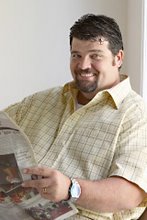Seeing the fleet peacefully at anchor 9,000 feet below his plane, Fuchida dove out of a white cloud then radioed back to the Japanese fleet saying, "Tora, tora, tora!" The attack on Pearl Harbor had begun.
The smoking carnage of the surprise attack left an aftermath of five destroyed battleships and fourteen others sunk or damaged. It was a great day for Fuchida and the last day for more than 2,300 Americans. A day, one might say, of infamy.
On the other side of the Pacific, a sergeant by the name of Jacob DeShazer was peeling potatoes at his base in Oregon. Not long after, DeShazer would have the opportunity to volunteer for a special squadron lead by Colonel Jimmy Doolittle. This top-secret mission would dare to directly bomb Tokyo and the heart of the hated Japanese. Jacob couldn’t sign up fast enough.
By all accounts, Doolittle’s raid was a stunning success, but DeShazer’s B-24 bomber ran out of fuel before it reached a safe place in China. Forced to bail out over Japanese-held territory, DeShazer was captured and spent the next 40 months of his life as a prisoner of war. He spent 34 of those months in solitary confinement and was routinely tortured by his captors. As he watched fellow American prisoners horribly tortured and executed or starved to death, DeShazer remained alive— and so did his hatred for the Japanese.
Fuchida, on the other hand, was celebrated as the undisputed Japanese "Hero of Pearl Harbor." In 1942, he came down with a case of appendicitis and was unable to fly. That attack probably saved his life because he missed the battle of Midway where the Japanese Navy was soundly defeated.
A few years later, Fuchida narrowly missed death again when he was ordered to leave Hiroshima the very day before the nuclear bomb was dropped. The hated Americans were killing everyone he knew, it seemed. Just as Fuchida barely escaped death throughout the war, so did Deshazer in the Japanese prison camp.
Solitary confinement gave DeShazer time to chew on the subject of hatred. Clinging to life, he yearned to know God and begged his guards for a Bible. Two years latter, he finally received one and poured through the pages. When thumbing through the text, his eyes fell on the passage where Jesus cried out from the cross, “Father, forgive them. They know not what they do.” The black ink on the white page became words in his heart that would change him forever.
He later wrote, "I discovered that when I looked at the enemy officers and guards who had starved and beaten my companions and me so cruelly, I found my bitter hatred for them changed to loving pity . . .. I prayed for God to forgive my torturers, and I determined by the aid of Christ, to do my best to acquaint these people with the message of salvation."
On Aug. 20, 1945, a smiling Japanese guard swung open DeShazer’s cell door and said, "War over. You go home now." A few days later Americans parachuted into the camp and sent the prisoners to hospitals where they would slowly recover.
Jacob finally got to go to his beloved home, but he didn’t stay there long. His Christian transformation was so dramatic he went back to Japan, but this time as a missionary. No longer hating the Japanese, he wanted to make a difference there.
Fast forward now to one day in October 1948. While getting off the train in Tokyo, Fuchida, the Japanese war hero, now a farmer, saw an American handing out leaflets in Japanese. The title caught his eye: I Was a Prisoner of Japan. It grabbed his attention, especially the part about Pearl Harbor. Even though they had been enemies, Fuchida had admired the courage of the Doolittle Raiders. He continued reading.
The whole Christianity thing was a big surprise to Fuchida. A friend told him to get a Bible, but Fuchida could not find one in Japanese. Just a few days later, on the same train platform, a Japanese man stood with boxes of books. "Get your Bible. It is food for your soul," the man cried in Japanese. Struck by the coincidence, and despite his Shinto heritage, he bought one.
The opened Bible fell to Luke 23:34, and he read those words for the very first time, "Father, forgive them, for they know not what they do."
Fuchida later wrote, "I was impressed that I was certainly one of those for whom Jesus had prayed. The many men I had killed had been slaughtered in the name of patriotism, for I did not understand the love of Christ."
He changed from a bitter ex-war hero to a man on a new mission. Fuchida went on to become an evangelist throughout Japan and Asia. He and DeShazer eventually became very close friends.
The Brewer salutes them both as we think about the cross at this Easter time. Good Friday was only good because of the one being executed and the goodness of God still leads men to repentance today.
You can Visit The Brewer online at www.FreshFromTheBrewer.com




1 comment:
Hey there, was practicing Google-fu to see who else was writing about Jacob DeShazer and found your post.
This world has lost a very special person with his passing. But what a story and I think its a very safe bet he has gone onto his Heavenly rewards.
A minor nit-pick, Doolittle Raiders flew the B-25 Mitchell medium bomber off USS Hornet. Not the Consolidated B-24 Liberator heavy bomber.
Have a good Easter.
Post a Comment